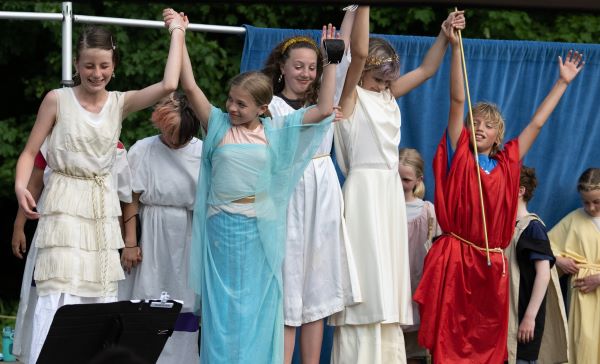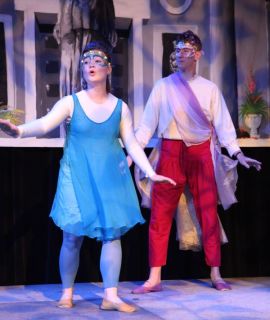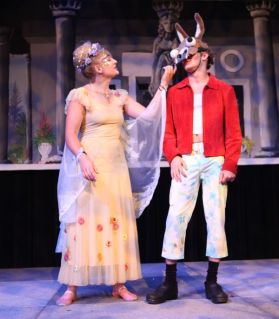

Theater Develops Creativity, Empathy and Confidence
The performing arts help children develop a range of beneficial life skills, such as quick thinking, problem solving, and building self confidence. Theater strengthens empathy by asking a child to embody what their character is feeling and experiencing, and putting on a play also requires students to work as a team. In Waldorf education, students are involved in class plays and musical performances every year. We see the wide-ranging positive impact on our students and the powerful boost to their self confidence that the performing arts provide.

This article was originally written by Julia Savacool and published by Scolastic.com
It’s no big secret that getting kids involved in the performing arts can have major payoffs in school. After all, research shows that children who sing/dance/act/play their little hearts out are four times more likely to be recognized for academic achievement compared with their non-performing friends — and they tend to have enhanced cognitive, motor, and social development to boot. But the benefits don’t end there. Getting up on stage can enrich your child’s life in all sorts of surprising ways.
Kids Who Perform Are Quick Thinkers
Whether you’re a kid or an adult, the ability to stay calm and carry on is what keeps a small blooper from mushrooming into a major one. “When something goes wrong during a show, kids learn to improvise,” says Brian Olkowski, a 4th- and 5th- grade teacher in San Ramon, CA, and director of the school’s drama club. “One of the best things kids discover is how to think on their feet.” No performance is ever perfect, says Olkowski, so the real skill is learning to minimize errors and get back on track. “When someone flubs a line, the other kids learn how to cover for him,” he says. “I tell them it’s not about never making a mistake; it’s about never letting the audience see your mistake. Those are great skills that transfer to the classroom setting as well, whether it’s giving a presentation in front of peers or being called on to answer questions.”
Still, it helps to prepare your child for the possibility of problems cropping up, says Lisa Lollar, Psy.D., a psychologist in Denver, CO, who works with performing artists. “Talk about what she might do if she drops her music or forgets a line,” says Lollar. “Working through the scenarios in advance and coming up with a solution will help her feel prepared if something surprising happens.” The ability to expect the unexpected — and then roll with it — will give your child confidence any time she tests new waters. Lollar adds: “If you help your child define success as being willing to try something new, the idea of messing up isn’t so scary.”
They Master Their Anxiety
.jpg/2022%20Grade%2010%20Greek%20Play_Moment(3)__329x320.jpg) Let’s face it: Even grown-ups get nervous when we have to speak in front of our colleagues or give a presentation to the boss. Learning from an early age how to cope with performance jitters gives kids a leg up in those big life moments. “The first step for a parent is to normalize a child’s feelings of anxiety,” says Lollar. “Tell them, ‘You know, a lot of kids — and even adults — feel nervous before a performance. It’s completely natural.’” It won’t take away the nerves, but it will let your child know there’s nothing wrong with feeling this way.
Let’s face it: Even grown-ups get nervous when we have to speak in front of our colleagues or give a presentation to the boss. Learning from an early age how to cope with performance jitters gives kids a leg up in those big life moments. “The first step for a parent is to normalize a child’s feelings of anxiety,” says Lollar. “Tell them, ‘You know, a lot of kids — and even adults — feel nervous before a performance. It’s completely natural.’” It won’t take away the nerves, but it will let your child know there’s nothing wrong with feeling this way.
Then before the big show, talk your child through his worries by reminding him of other moments when he’s felt anxious, even when things turned out well. “Remind him of the baseball game when he felt really nervous at the plate, but managed to get a great hit,” suggests Lollar. “Recalling past experiences with positive outcomes gives a child confidence.” Other tricks: Help your child calm his body in the minutes before the performance begins by taking four or five long, deep breaths or counting backward from seven. Both force his mind to focus on something other than his nerves.
Once the show is over, let your child bask in his accomplishment, then casually comment on how well everything went. He will carry this experience with him for the next time, as more evidence that he can successfully perform under pressure.
Performers Express Brand-New Emotions
 One of the wonderful things about being in a play is that for a short period of time, you get to become someone else. For a child who struggles to talk about her feelings, there is a tremendous relief in disappearing behind a character and using it as an intermediary through which to open up. “It is a very safe way for kids to try out certain feelings — and take ownership of them — while playing the role of someone else,” says Olkowski, who also runs a summer theater program for children. “I’ve worked with shy kids who are able to blossom on stage and express themselves in a way they aren’t comfortable doing around their peers.”
One of the wonderful things about being in a play is that for a short period of time, you get to become someone else. For a child who struggles to talk about her feelings, there is a tremendous relief in disappearing behind a character and using it as an intermediary through which to open up. “It is a very safe way for kids to try out certain feelings — and take ownership of them — while playing the role of someone else,” says Olkowski, who also runs a summer theater program for children. “I’ve worked with shy kids who are able to blossom on stage and express themselves in a way they aren’t comfortable doing around their peers.”
Playing the role of someone else also teaches kids about empathy. “They learn to put themselves in someone else’s shoes,” says Jessica Hoffman Davis, author of Why Our Schools Need the Arts. “In performing the part of someone else, they learn what it’s like to think like that other person.”
Parents can also use a child’s theater performance to open a dialogue about sensitive issues. “Take the experience of a character in the play and tie it to your child’s situation,” says Lollar. “If your child is nervous about her first day of school, it helps to say, ‘Remember when you were in that play, and the character Lucy was scared? How did she handle it? What was she feeling? Did it work out OK for her?’ Drawing parallels to the character’s situation and her own will make your child more comfortable talking about her feelings.”
For kids who aren’t into acting, dance can offer another way to explore their interior world, says Annie Spell, Ph.D., a child psychologist in Lafayette, LA, and co-creator of Leap ’N Learn for the Classroom, a movement program for kids. “Dance teaches kids to think in a totally different way. You take the physiological experience of an emotion and assign it a corresponding movement instead of a word. It can be a powerful tool for kids who have trouble expressing themselves.”
Their Self-Esteem Can Soar
 There’s nothing quite like hearing a crowd of total strangers laugh at your joke or applaud your double pirouette to make you feel like a star. “Hearing the audience clap at the end of the show is an incredible feeling,” says Olkowski. “The kids are like, ‘Hey, this is for me!’ That instant positive feedback is really rewarding.”
There’s nothing quite like hearing a crowd of total strangers laugh at your joke or applaud your double pirouette to make you feel like a star. “Hearing the audience clap at the end of the show is an incredible feeling,” says Olkowski. “The kids are like, ‘Hey, this is for me!’ That instant positive feedback is really rewarding.”
But it’s more than just the ego boost from the fans — any type of performance requires teamwork to succeed. “Kids are introduced to the notion of an ensemble,” says Davis. “It’s not just you up on stage. You are responsible for a larger group that is counting on you to do your part so they can do theirs.” That weight of personal responsibility is rare in a child’s world, and successfully delivering his lines or hitting the right guitar chords means more because of what’s at stake.
“During a performance, kids become part of a larger system, working toward a common goal,” adds Spell. “It is the culmination of weeks of practice, so the performance itself becomes the reward for all that work.” Although a positive performance will give your child a self-esteem injection, it’s important to put the emphasis on effort, rather than results. “Every child will fail at some point,” notes Spell. “But if they judge themselves on putting their best effort forward and not on being perfect, the experience can still feel rewarding.”
Performers See the World in a Whole New Way
 At the end of the day, the transferable skills a child learns from performing may not be nearly as important as the experience of performing itself. “We’re always looking for ways the arts can benefit kids in other areas of life,” says Davis. “It’s as if art for art’s sake isn’t worth our time, when in fact, it gives kids an awareness about themselves and creative skills they’d never learn otherwise.” She may never apply the improvisation skills she learned during the school play to a math equation or turn her teamwork with other dancers into leadership on the school playground. But simply by having been part of the performance process, your child has been exposed to a new way of thinking and doing. And that alone is a success to be proud of.
At the end of the day, the transferable skills a child learns from performing may not be nearly as important as the experience of performing itself. “We’re always looking for ways the arts can benefit kids in other areas of life,” says Davis. “It’s as if art for art’s sake isn’t worth our time, when in fact, it gives kids an awareness about themselves and creative skills they’d never learn otherwise.” She may never apply the improvisation skills she learned during the school play to a math equation or turn her teamwork with other dancers into leadership on the school playground. But simply by having been part of the performance process, your child has been exposed to a new way of thinking and doing. And that alone is a success to be proud of.
